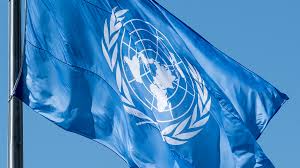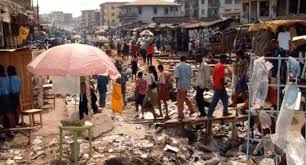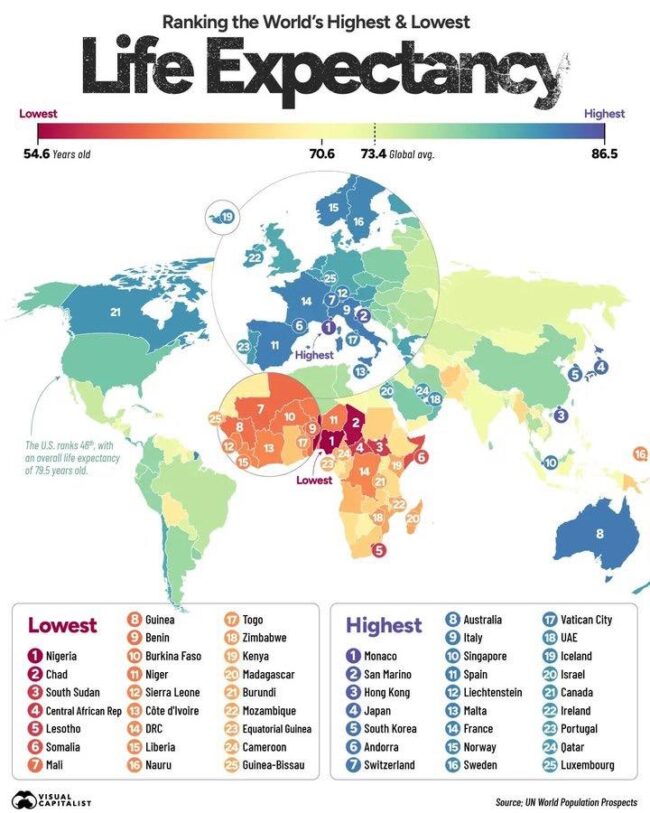
Nigeria Ranks Lowest in Global Life Expectancy – UN Declares Alarming 54.9 Years Average Lifespan
A nation rich in oil but poor in life: Why Nigerians are dying young in their own country.
Abuja, Nigeria – October 7, 2025
Nigeria, Africa’s most populous nation and one of its wealthiest, has been declared the country with the lowest life expectancy in the world, according to the 2025 United Nations Human Development Report.
The average Nigerian is expected to live a troubling 54.9 years, far below the global average of 73.4 years, nearly 20 years below. The finding paints a grim picture of the quality of life in Africa’s most populous nation.
The UN describes the figure as “deeply alarming,” warning that Nigeria’s human development crisis has reached a breaking point.

A Country Where Survival Is a Daily Struggle
The UN’s data exposes a painful reality: Nigerians are dying younger than citizens of war-torn countries like Afghanistan and Sudan.
Behind the statistics lie decades of poor governance, worsening mass poverty, collapsing healthcare, and chronic insecurity that have turned everyday life into a fight for survival.
Hospitals are under-equipped and understaffed. Doctors are leaving the country in droves. Millions live without clean water or electricity. And the government, the report suggests, has “abandoned its duty of care to its citizens”
“When a nation’s citizens die before reaching 60 on average, it’s not an act of fate, it’s a reflection of failed leadership,” said Dr. Ifeanyi Ogbonna, a Lagos-based public health analyst. “Nigeria’s crisis is man-made.”
A Nation Bleeding Its People
Insecurity continues to choke the country from every direction. In the north, Fulani terrorist attacks and banditry persist, targeting and killing farmers. In the south, kidnappings and economic despair deepen.
The result? Over three million Nigerians displaced from their homes, many wasting away in overcrowded camps without food or healthcare.
Meanwhile, Nigeria’s elite, the political class, live in gated luxury, insulated from the consequences of the very chaos they’ve created.
The same country that exports crude oil cannot guarantee clean drinking water to its citizens, the UN report notes. This contradiction lies at the heart of Nigeria’s declining life expectancy.
Beyond the Numbers: A Moral Collapse
The tragedy goes beyond physical survival, it is moral and institutional. A country that should be thriving has normalized decay. Teachers are unpaid. Hospitals are death traps. Youths are unemployed. The elderly die in silence.
The UN report also notes that despite being Africa’s largest economy, Nigeria’s investment in health and social welfare remains among the lowest on the continent, less than 4% of its annual budget, pushing millions into hopelessness and despair.
According to the UN, life expectancy reflects the overall well-being of a nation’s population, encompassing health, nutrition, education, and access to public safety. Life expectancy is more than a health indicator, it is a measure of dignity and Nigeria is losing hers fast.
The Call for Urgent Reform
The short life expectancy also reflects Nigeria’s staggering wealth gap, where the majority of citizens live on less than $2 a day while political elites enjoy extravagant privileges. High unemployment, poor nutrition, and environmental degradation continue to push millions into extreme vulnerability.
Public health experts describe the figure as a “national emergency,” arguing that Nigeria’s leadership has failed to address structural inequalities and health sector decay. They call for a radical overhaul of public health, massive investment in nutrition, education, and rural development, and an end to corruption that bleeds the system dry.
Without urgent intervention, experts warn that the country risks a generational crisis, as younger populations face reduced life prospects due to hardship and lack of opportunity.
Peoples Chronicles Editorial Note:
When a nation becomes a graveyard for its own people, statistics cease to be numbers, they become tombstones. Nigeria’s 54.9-year life expectancy is not just a UN report; it is a mirror, reflecting a country gasping for air while its leaders look away.
